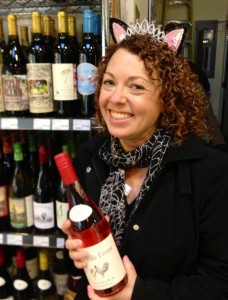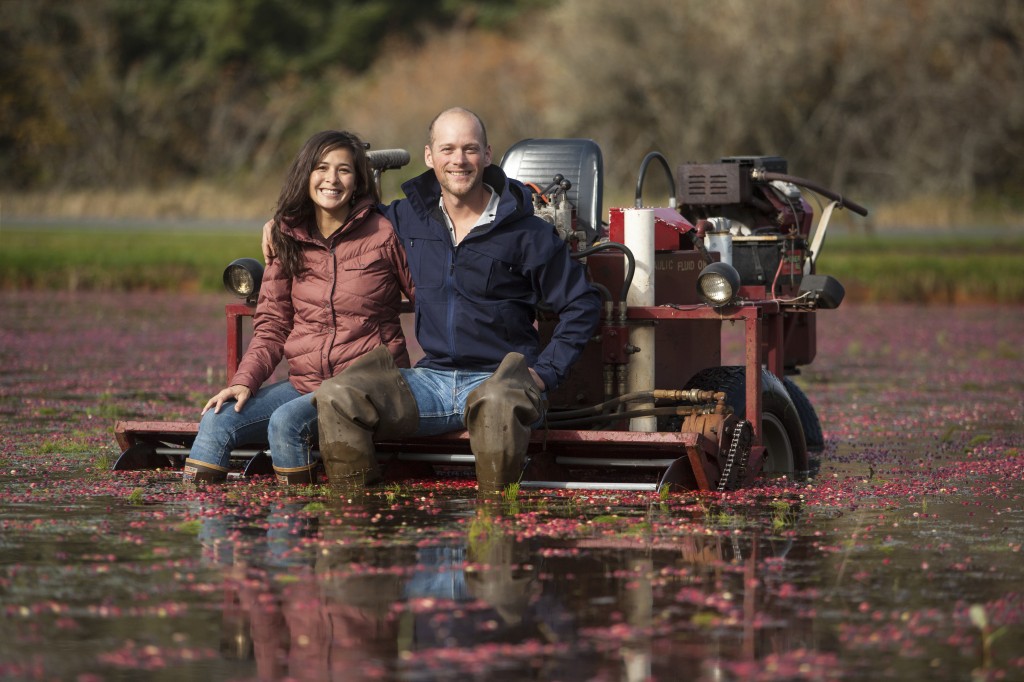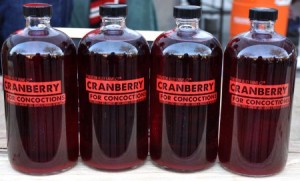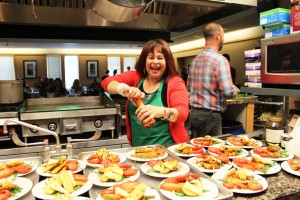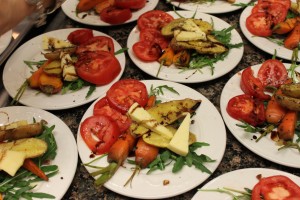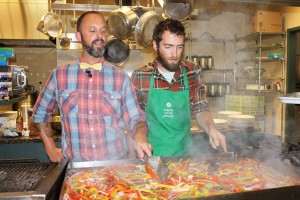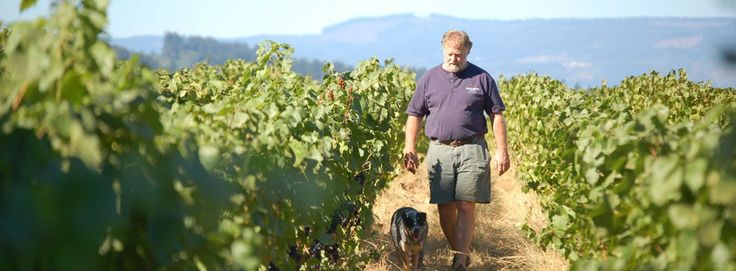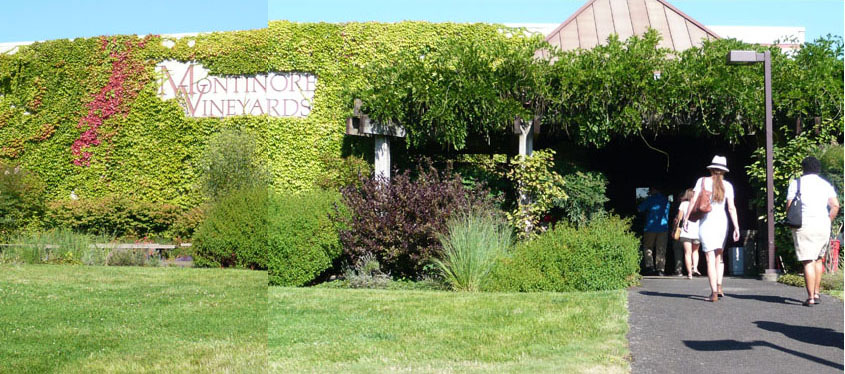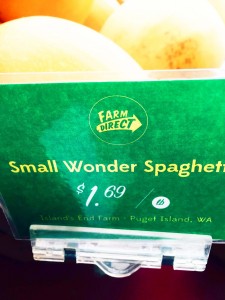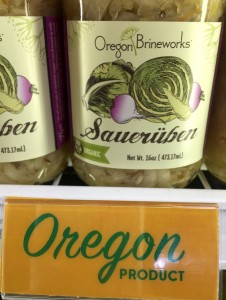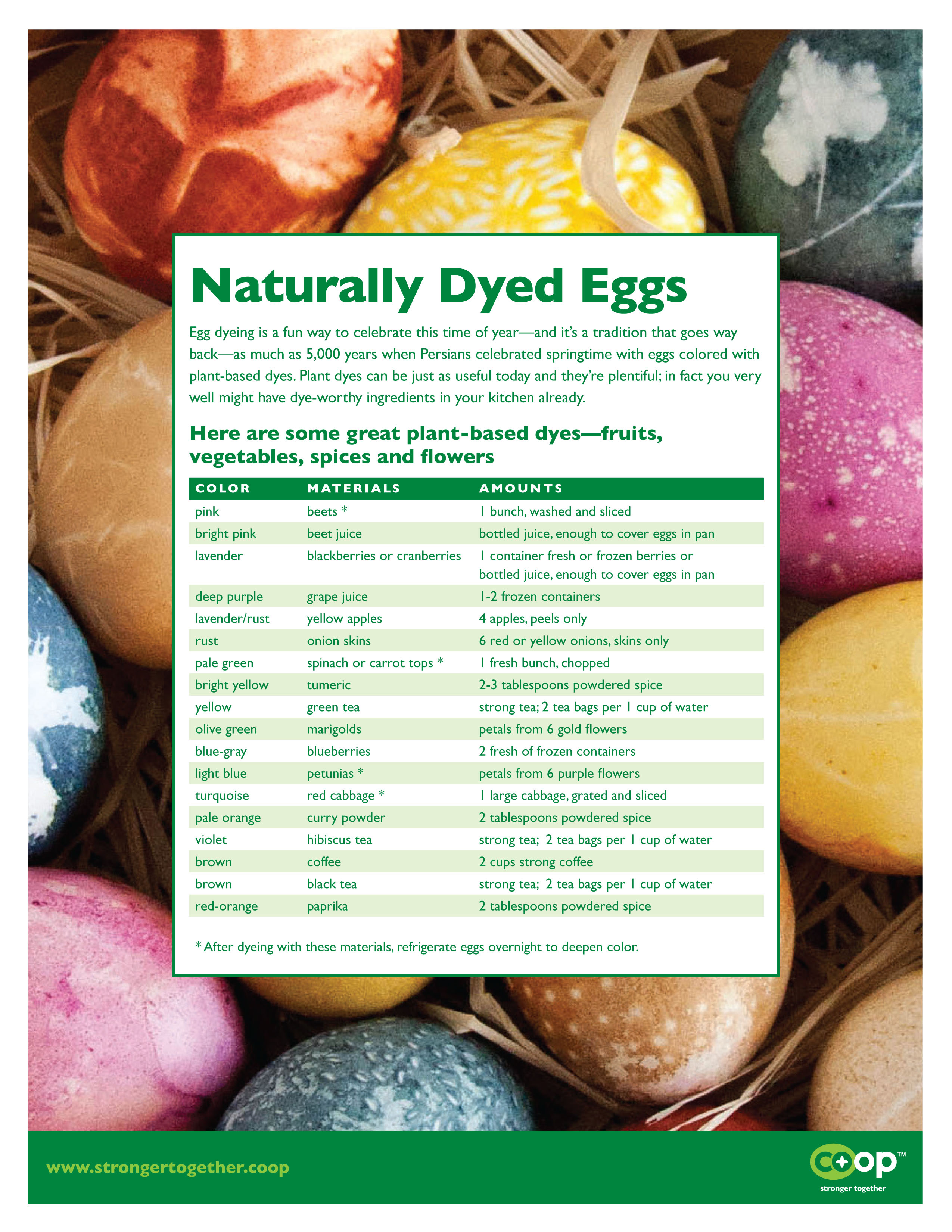Local Organic Cranberry Juice Tasting at the Co-op
The farmers of Washington state’s first and only certified organic cranberry farm will be sampling out their juice at the Co-op on the first day of our Spring 2015 Owner Appreciation Week. Stop by the store and try some on Sunday May 10 at 11 a.m. to 1 p.m.
Starvation Alley encompasses a total of 10 acres in Seaview Washington and Long Beach. Jared Oakes and Jessika Tantisook took over the farm where Oakes grew up in 2010. They wanted to farm cranberries organically, but were told by farmers and other experts that it wasn’t possible. They explored that assumption and eventually gained organic certification for their farm.
“It is hard, especially in the beginning because we didn’t have any support. If you want to learn to grow organic apples you could probably find enough stuff on line, call universities, or get advice from professionals. That wasn’t available for cranberries. As new farmers transitioning to organic we lost a lot of production for the first two years, hence the value added products,” Tantisook said.
Starvation Alley created a brand of juice that attracted the attention of the emerging craft cocktail industry. The farmers sell their product to 70 accounts, mostly bars in Portland and Seattle. They sell their juice and cranberries at farmers markets and locally at Astoria Co-op. The juice is raw, unsweetened and undiluted cranberries. It is not heated or pasteurized which Tantisook says enhances the health benefits and taste.
Starvation Alley Farms is building its research database with a goal of spreading sustainable farming and educating consumers about the food system and the importance of supporting local farmers. They are working with two other cranberry growers on the Long Beach Peninsula to transition to organic certification. There are currently only about 300 acres of organic cranberry farms in the U.S. out of 39,000 total acres of producing cranberry bogs.
Spring Farm to Fork Dinner
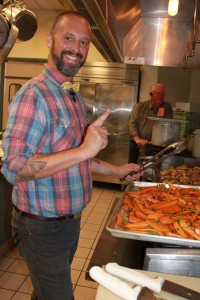
Thanks so much for the enthusiasm for local food, Folks! The event is sold out.
When: Wednesday June 3 at 6 p.m.
Where: Columbia Center Coho Room 2021 Marine Drive Astoria, OR 97103
Event Details:
Some of the first local food crops of the season will be the highlight of a Farm to Fork Demonstration Cooking Class & Dinner in June. Astoria Co-op Grocery, Columbia Memorial Hospital’s Nutritional Department, and Chef Marco Davis have been working together to do a series of these local food events, in an effort to inspire people to eat fresh and healthy foods, with an emphasis on seasonal vegetables. And this time the class will be offered at a new lower price. In the past the cost was $50 and now it is being offered for $35 each or two for $60.
“This is an amazing deal for such a high quality four course meal and wine pairings plus cooking instruction, but we’re going to try and work within a slightly smaller budget this time, because we want to make this accessible for everyone. It is our desire to expose as many people as we can to healthy foods through this event,” Astoria Co-op Grocery Marketing Director Zetty Nemlowill said.
Columbia Memorial Hospital’s Nutrition Services Manager Vann Lovett echoes this desire to connect food, health and the community.
“Good food is so essential to health and well-being. We are excited to have another opportunity to collaborate with the Co-op in providing education to help build a healthy community,” Lovett said.
The Co-op will use its relationships with local farmers and other vendors to provide local and organic ingredients. Foods are harvested just before the class and the menu is designed based on what’s freshest and in season. Chef Marco is currently reaching out to local farmers to see what will be available. He says he will for sure be doing a rhubarb and strawberry dessert. He’s been experimenting with a new recipe for kale pesto, and he’s hoping that salmon will be plentiful. All of Chef Marco’s Farm to Fork dinners just so happen to be gluten free meals. Chef Marco will provide recipes and explain his cooking process as he prepares dinner before your eyes. Many of the growers will also be guests of the dinner, providing information about their farms and the food.
.
Beans for Bags
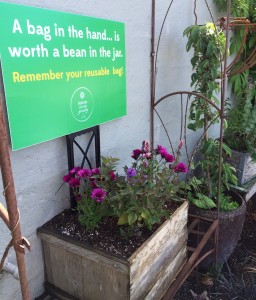 “Beans for Bags” is a popular donation program we’ve seen at several food co-ops and we’re going to give it a try! The aim is to encourage conservation of disposable bags by offering customers a dried bean in exchange for bringing in their own shopping bag; one bean is given for each bag used. The bean represents 5¢, and customers may choose which one of three community organizations they would like to support with their bean.
“Beans for Bags” is a popular donation program we’ve seen at several food co-ops and we’re going to give it a try! The aim is to encourage conservation of disposable bags by offering customers a dried bean in exchange for bringing in their own shopping bag; one bean is given for each bag used. The bean represents 5¢, and customers may choose which one of three community organizations they would like to support with their bean.
Shoppers simply place their bean(s) in the slot(s) of their choice in jars located in the store. At the end of each quarter the beans will be counted and each of the organizations will receive a check proportionate to the number of beans they received in their jar.
Current Recipients:
This fall when you bring a reusable shopping bag to the Co-op, you’ll be helping the planet, and supporting some great community causes.
North Coast Watershed: supporting a goal to improve stream habitat to create a sustainable environment for salmon and people.
Camp Kiwanilong: general maintenance, replacing bunk beds, and replacing cabins.
Clatsop Animal Assistance: veterinary care including spay and neuter fees, pet adoption promotion, and any other needs not covered by the Clatsop County Animal Shelter’s budget.
Apply to Become a Recipient:
Community organizations can apply to become recipients of funds and they will be selected by the Co-op Board quarterly. Click here for an application.
We will update you with how the program is going and hopefully we can all share in the success by turning reusable shopping bags into money for worthy causes, diverting landfill waste, and conserving trees.
New Strategic Plan Unveiled
The Board of Directors adopted Astoria Co-op Grocery’s Strategic Plan in April 2015, unveiling the plan to the ownership at large at the Co-op Annual Meeting on May 3, 2015. For a printable version, click here.
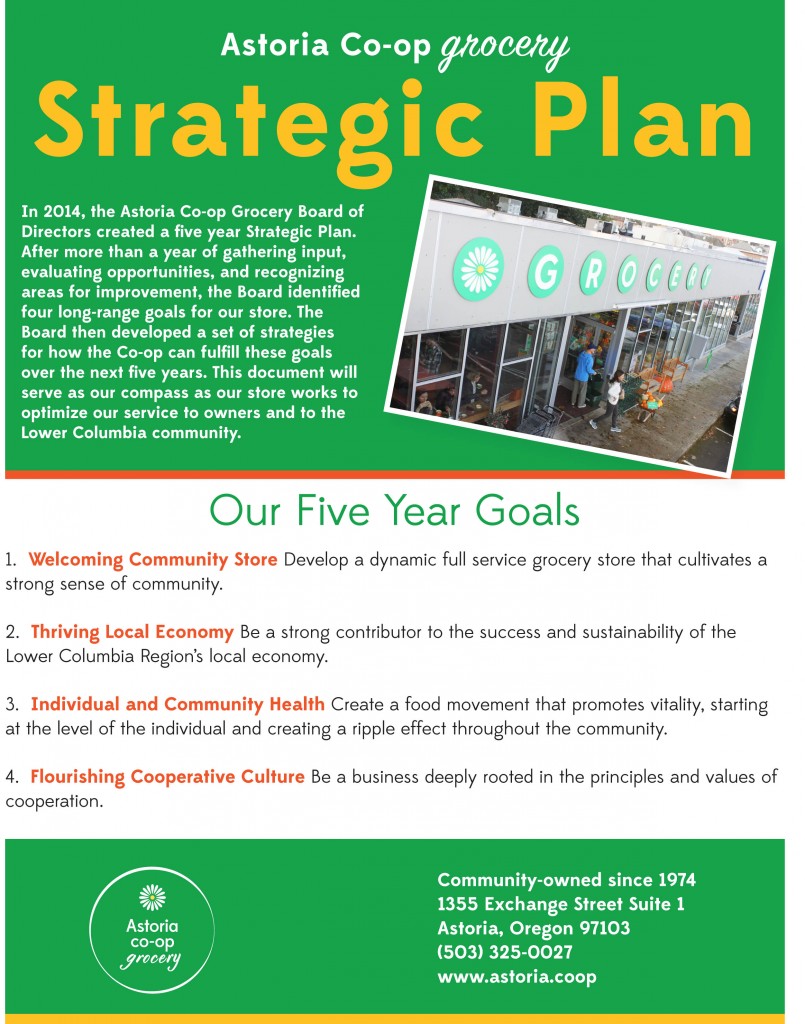
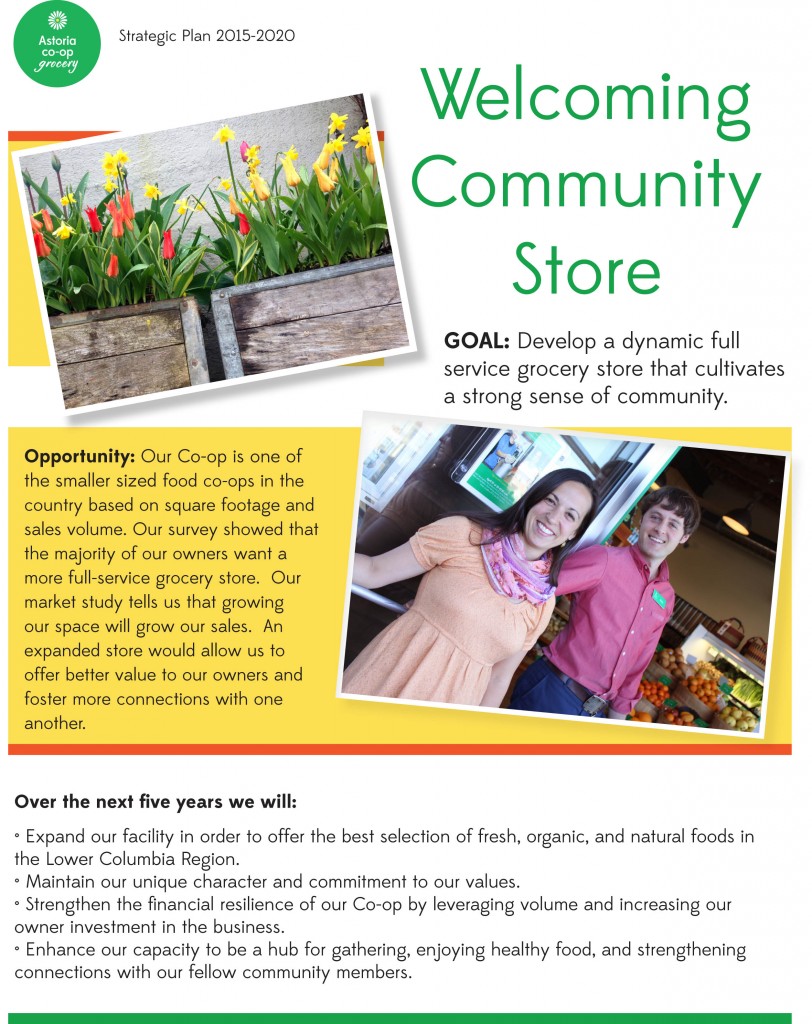
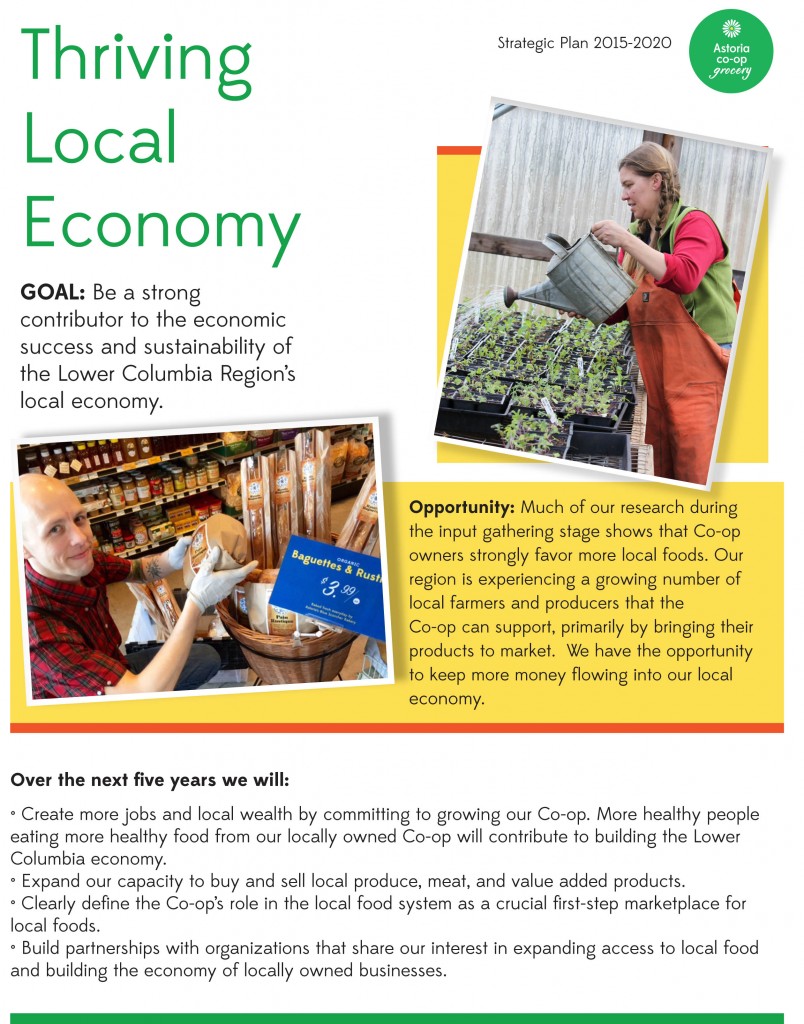
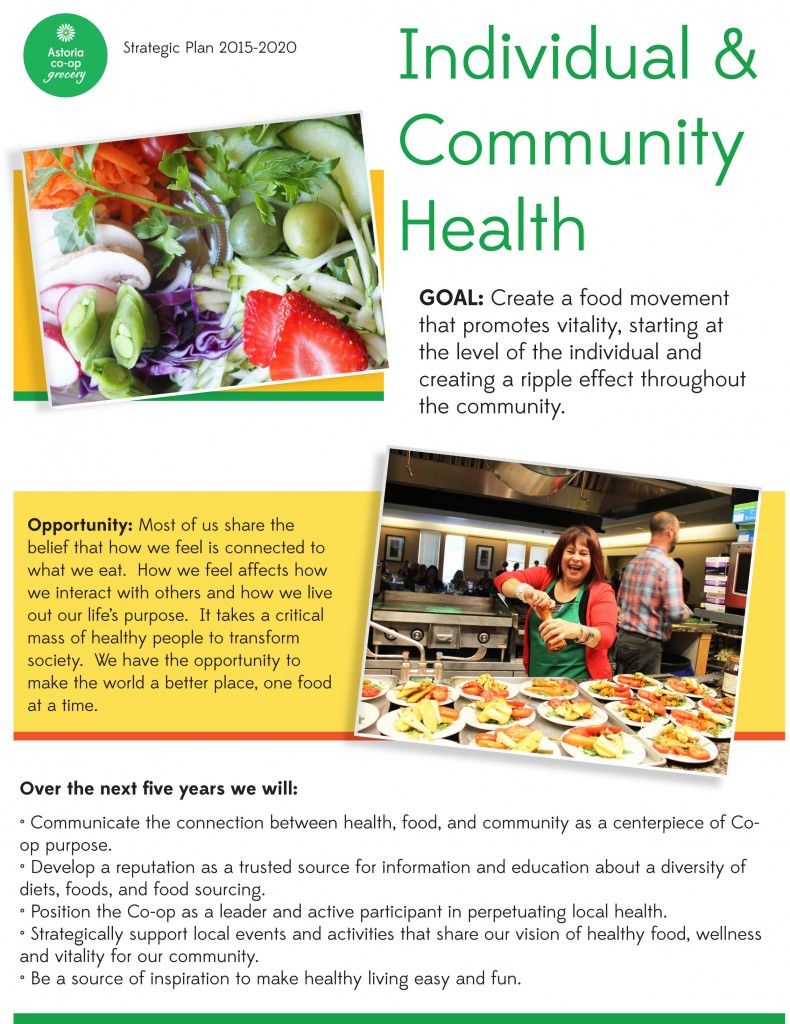
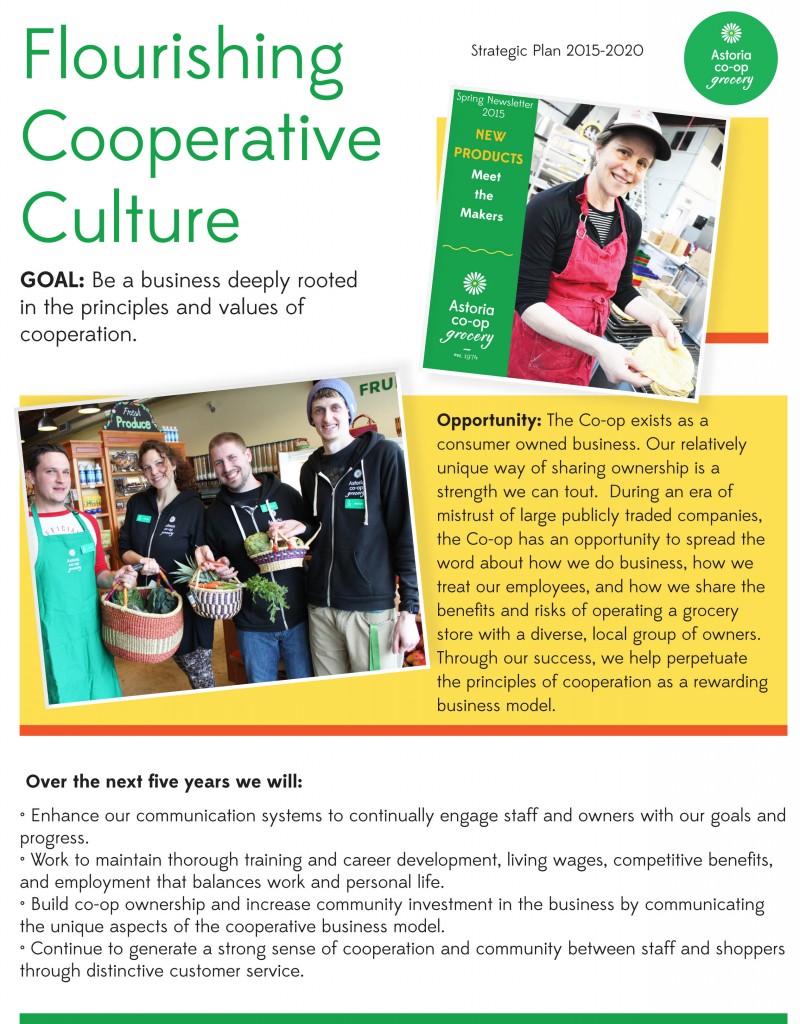
Montinore Estate Wine Tasting
Rudy Marchesi, a winegrower and owner of Montinore Estate, will be at Astoria Co-op Grocery on Thursday May 14, 2015 from 4:00 p.m.-6:00 p.m. offering samples of his wine. This is part of the fun for Co-op Owner Appreciation Week!
Montinore Estate is a 270 acre certified organic and biodynamic vineyard south of Forest Grove. Biodynamic practices enhance the health and vitality of the farm and subsequently aim to improve quality of the product, making wines more expressive of origin. A pasture, wildflowers, and pond provide habitat for wildlife including beneficial pollinators as well as predatory insects that go after pests.
Montinore wines come from the seven varieties of grapes grown on the estate. Half the vineyards are pinot noir, in addition to white wines from grapes that grow well in Oregon; Riesling and pinot gris to name a few.
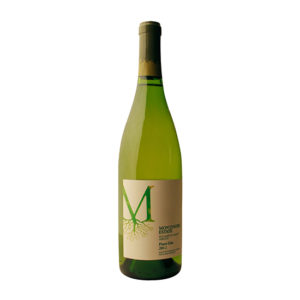 Marchesi purchased Montinore in 2005. When he was growing up, he remembers his grandfather making wine at home. Then in graduate school for clinical psychology, living near vineyards in Sonoma County, Marchesi started making wine himself, and never looked back. That was 40 years ago. In the wine business, his psychology background does come into play, handling the people that come with selling wines in 45 states, several countries, plus up to 30 employees depending on the time of year.
Marchesi purchased Montinore in 2005. When he was growing up, he remembers his grandfather making wine at home. Then in graduate school for clinical psychology, living near vineyards in Sonoma County, Marchesi started making wine himself, and never looked back. That was 40 years ago. In the wine business, his psychology background does come into play, handling the people that come with selling wines in 45 states, several countries, plus up to 30 employees depending on the time of year.
“Working with living systems and organisms is a healthy way to spend my time. It provides a lot of insight into the world around me and it’s very creative, especially on the winemaking end. It is a craft that involves a great deal of subtleties; it heightens our senses as winemakers when we work with these subtleties to create an expression of our farm,” Marchesi said.
Co-op Board Election
On Sunday May 3 2015, all current owners of Astoria Co-op Grocery are invited to our Annual Meeting where there will be a vote for the following people who serve on our Board of Directors:
Andrea Larson Perez
Current Board Member Running for Re-election
 Q: Where are you from and how did you find yourself on the North Oregon coast?
Q: Where are you from and how did you find yourself on the North Oregon coast?
A: I am a native Floridian. I moved to Sacramento, California after high school and made my forever move to the Lower Columbia in 1994. First residing in Ilwaco, WA and then in Astoria beginning 1998.
Q: How do you spend your days, including career and/or family, plus hobbies/recreation?
A: My career was spent in public relations, marketing and sales primarily in the publishing industry, but also included healthcare and some local business representation. After writing for others for years, I decided to move into that arena for myself. I have one book published and am beginning work on a second. Other than the long list of writing projects I will be working on over the next twenty years, I devote my time to my family, travel and other artistic endeavors.
Q: Why do you want to be on the board?
A: I have worked part-time at the Co-op for nearly 3 years. I have enjoyed every single minute of that experience, but other demands on my time have led me to seek a transition in my role at the Co-op. I want to maintain my involvement in this wonderful organization that I believe in so deeply!
Q: What aspects of the Co-op do you think are going well currently?
A: Due to my up close and personal experience being a staff member at the Co-op, I would say that this place ROCKS! It’s an exciting time to be a contributing member of the team.
Q: What do you hope to accomplish during your term, if elected?
A: If elected, I hope to continue to be a positive and supportive voice in the future of the
Co-op. We have exciting growth plans and I believe my experience and skill set have much to offer in helping the organization reach it’s goals.
Norma Hernandez
Current Board Member Running for Re-election
 Q: Where are you from and how did you find yourself on the North Oregon coast?
Q: Where are you from and how did you find yourself on the North Oregon coast?
A: I was born in Puerto Rico and spent 20 years in the northeast before coming to the Oregon coast. I vacationed here and fell in love with community and the beauty.
Q: How do you spend your days, including career and/or family, plus hobbies/recreation?
A: I work for Clatsop County Public Health and the Healthy Families and WIC programs. I am President of the Astoria Parks and Recreation Board of Directors and on the Board of North Coast Food Web. I host a monthly Latin music program on KMUN and volunteer for other organizations including the Astoria Downtown Historic District Association.
Q: What has your experience on the Astoria Co-op Board of Directors been like and why have you decided to run for re-election?
A: I have learned so much by being part of this group. I believe in the work we do and its importance to the health and quality of life in our community.
Q: What aspects of the Co-op do you think are going well currently?
A: I am proud of the work we’ve done on a strategic plan, the ongoing improvements to the store and the resulting shopping experience.
Q: What do you hope to accomplish during your term, if re-elected?
A: I will continue to be a contributing part of this wonderful team as we work with member/owners to shepherd the Co-op safely and appropriately into the future. The Co-op will continue to be a work in progress as all good things are. That process requires attention to detail, dedication and a passion for the work.
Libby Lawrence
Current Board Member Running for Re-election
 Q: Where are you from and how did you find yourself on the North Oregon coast?
Q: Where are you from and how did you find yourself on the North Oregon coast?
A: I have lived in Astoria for 6 years. I did not move here on purpose, but have grown to love this place deeply.
Q: How do you spend your days, including career and/or family, plus hobbies/recreation?
A: I spend most of my time raising two young boys, and I also work for Astoria Parks and Rec., leading fitness classes. Free time finds me hiking, surfing or reading.
Q: What has your experience on the Astoria Co-op Board of Directors been like and why have you decided to run for re-election?
A: I have learned so much in two years on the Co-op Board. We have big goals for the next several years, and it is exciting to be a part of the process.
Q: What aspects of the Co-op do you think are going well currently?
A: The board and staff leadership have been incredibly thoughtful about our vision for the future. The Co-op has so many smart people who care and are invested in the future of our store. It is a calm, clean and joyful place to shop and run into friends.
Q: What do you hope to accomplish during your term, if re-elected?
A: I hope to be a rational, positive and thoughtful voice on the board for another term.
Our Parking Lot Gardener at May Lecture
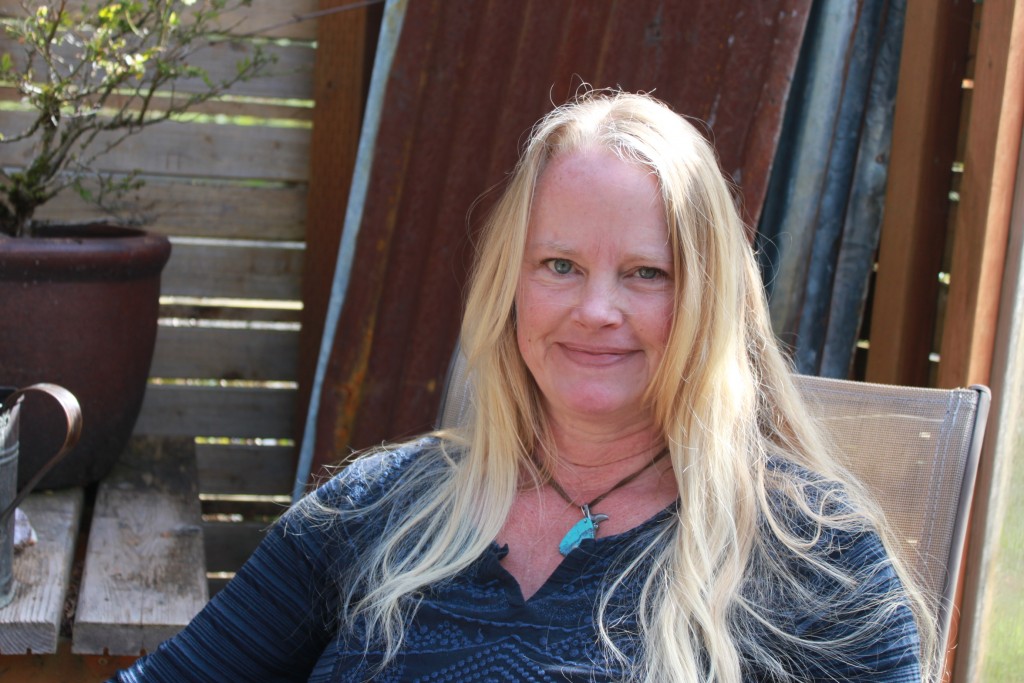 When our General Manager Matt Stanley asked Horticulturist Becky Graham to take over our parking lot garden, Becky says she had a feeling this would be a very special job, due to the special people who shop and are a part of the Co-op. Becky wants to express what a pleasure it is sharing her skills and passion and we at the Co-op feel the same! We get so many wonderful comments about our garden that makes the parking lot a welcoming space.
When our General Manager Matt Stanley asked Horticulturist Becky Graham to take over our parking lot garden, Becky says she had a feeling this would be a very special job, due to the special people who shop and are a part of the Co-op. Becky wants to express what a pleasure it is sharing her skills and passion and we at the Co-op feel the same! We get so many wonderful comments about our garden that makes the parking lot a welcoming space.
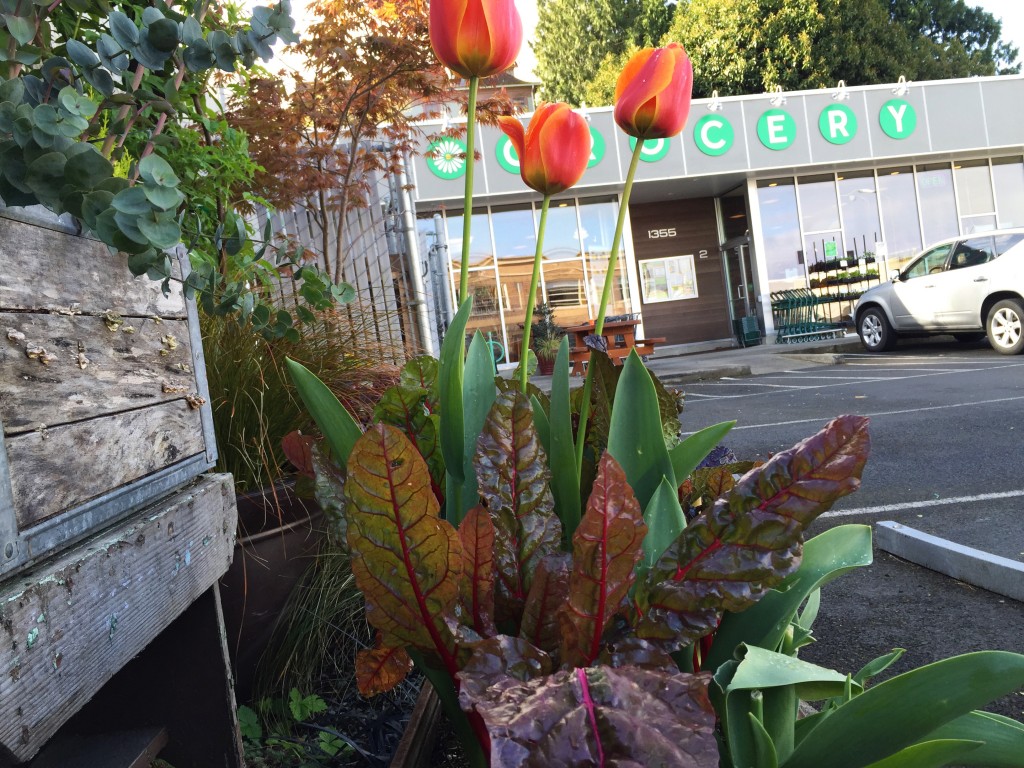
“I’ve met hundreds of people who tell me how they’ve appreciated the garden. The fact they make a point to let me know how they appreciate I, that they went up and touched it and smelled it is even better, or asking about a plant. It is kind of an instant connection. That has brought so much joy to me. It’s been a gift. Sometimes I have to pinch myself,” Becky said.
Our May lecture at Fort George Brewery will feature Becky. She has a business called Harvest Moon Designs, and has not only helped transform the Co-op’s outdoor space, but she takes her knowledge and passion about plants all over the community; from the rooftop of the Hotel Elliot to a healing garden that’s in the works at Columbia Memorial Hospital, for example. “Nature inspires, art follows” is a guiding principal in Becky’s designs.
One might imagine finding Becky’s home garden in Knappa on the pages of Sunset magazine. It is made up of raised beds that include an artful combination of edibles, ornamentals, and found objects such as rusty pipes that have been converted into planters.
“I hunt and gather for things that make me weak in the knees. Sometimes I don’t have any idea of how I will use it, but I know I will. I have an old copper washing machine and I know I’m either going to make a water feature out of it or a planter. I play with colors, texture, and materials I love,” Becky said.
Becky calls the garden her classroom, sanctuary, and playground. Part of her career includes garden coaching, helping others design their own gardens. Becky’s lecture will include photos and information to provide examples of things you can do with raised beds, containers, and art, similar to the Co-op’s garden.
“Mixing food you can grow locally in containers as well as ornamental and plants good for pollinators. I think about birds, honey bees, and butterflies. Some art happens naturally. You look and you see a combination of foliage and there’s a butterfly that lands there… that’s art as well as the things you bring in,” Becky said.
You can meet Becky and learn about gardening and design at the Co-op’s monthly food and wellness lecture, “Beers to Your Health” at the Fort George Lovell Showroom located at 426 14th Street in Astoria on Thursday May 14th at 7 p.m. Doors open at 6 p.m. There are food and drinks available for purchase. The event is free and open to all ages.
Defining “Local”
By Zetty Nemlowill Astoria Co-op Grocery Marketing Director
 If you’ve ever had food directly out of a garden, you know the flavor beats any conventional grocery produce, correct? The food we source from nearby farmers is just as good, if not better than food from your own garden. Big grocery stores have noticed that people really like local food. You can’t help but miss the large photographs of “local” farmers in produce departments. I’ve seen “local” peaches from Yakima. This is really different from Astoria Co-op Grocery’s idea of what local food is. So, our competition presents an interesting challenge for the Co-op; defining “local”.
If you’ve ever had food directly out of a garden, you know the flavor beats any conventional grocery produce, correct? The food we source from nearby farmers is just as good, if not better than food from your own garden. Big grocery stores have noticed that people really like local food. You can’t help but miss the large photographs of “local” farmers in produce departments. I’ve seen “local” peaches from Yakima. This is really different from Astoria Co-op Grocery’s idea of what local food is. So, our competition presents an interesting challenge for the Co-op; defining “local”.
Fresh food from farms in the area that are too small to supply bigger grocery stores gives the Co-op a competitive edge. So it’s very important for us to all understand the “local” difference at the Co-op. I wish I could think of something catchy like the Nike “just do it” catch phrase that would, in an instant, meaningfully convey the “truly” local difference at the Co-op to anyone who walks in our doors. But I haven’t yet. So, for now, the Co-op will define our version of “local” with honesty; using all our communication tools to consistently tell you where your food comes from.
Look for signs in the store that say “local” and “farm direct”. These are items we source from farmers and other producers from within a 40 mile radius. Growers and manufacturers we build relationships with actually deliver the products themselves. We like to get products from as close to home as possible, but many food, beverage, and wellness items are not currently available within our defined local area. So you will see “Oregon” and “Washington” signs throughout the store as well. While not exactly “local”, we’re very proud of carrying these unique items.
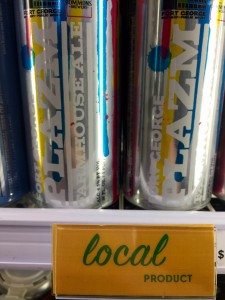 Why care about the Co-op’s definition of local? It’s the freshest and richest quality in terms of flavor and nutritional density. When food isn’t transported hundreds or thousands of miles this greatly cuts down on fossil fuel use and greenhouse gas. It’s pretty scary to think about food security, but it’s not just an issue that’s off in the distant future. The drought in California is causing agriculture shortages, resulting in food price increases; an example of why supporting the growth of farms in our area is important. We really like our farmers and other local producers, and want them to succeed with good jobs. We know how hard they work, sometimes for little to no return.
Why care about the Co-op’s definition of local? It’s the freshest and richest quality in terms of flavor and nutritional density. When food isn’t transported hundreds or thousands of miles this greatly cuts down on fossil fuel use and greenhouse gas. It’s pretty scary to think about food security, but it’s not just an issue that’s off in the distant future. The drought in California is causing agriculture shortages, resulting in food price increases; an example of why supporting the growth of farms in our area is important. We really like our farmers and other local producers, and want them to succeed with good jobs. We know how hard they work, sometimes for little to no return.
As the Co-op grows, our consumer-owners, shoppers, and board have all said that more local food should be a key element. In our fall survey, shoppers said supporting local, sustainable agriculture is the number one social issue the Co-op should champion. Our strategic plan reflects this stating in the next five years we will expand our capacity to buy and sell local food and products. And throughout that journey we will be explaining what our local is.
Naturally Dyed Eggs
For a printable PDF of this handout, click here.
